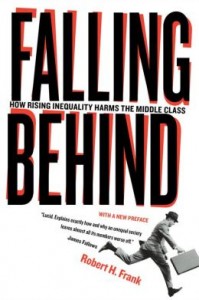The subject of income inequality took center stage in the public mind only in 2010 with the advent of Occupy Wall Street, but the widening gap between the top 1% and the rest of us had been the subject of fierce debate in economic circles for many years previously. The Cornell economics professor Robert H. Frank made a notable — and eminently readable — contribution to the public discussion with his widely read 1995 book, co-authored with Philip J. Cook, The Winner-Take-All Society. A decade later, Frank delivered the Aaron Wildavsky Lecture at UC Berkeley’s Goldman School of Public Policy on the same broad topic. Frank expanded the lecture into a book under the title Falling Behind in 2007, published by UC Berkeley Press. Last year the Press reissued the book with a new preface by the author.
In Falling Behind, Frank goes far beyond the superficial coverage of income inequality in much of the media, which is largely limited to dramatizing just how far and fast the gap has grown between the haves and have-nots. That’s old hat now (though it wasn’t in 2007).
Falling Behind: How Rising Inequality Harms the Middle Class by Robert H. Frank (2007) 177 pages ★★★★☆
Making use of homey thought experiments and references to behavioral psychology, Frank explains how income inequality forces people of lower or middle income to spend more than they can afford on housing, clothing, and sometimes even food — and how the policies that foster inequality worsen the “tragedy of the commons,” saddling society with inadequate public transportation, polluted air and water, crumbling infrastructure, and other frequently neglected problems.
Frank challenges conventional economic thought by introducing such concepts as “the rising cost of adequate,” “expenditure cascades” (tantamount to an arms race between the economic classes), “relative deprivation,” and “positional” versus “nonpositional” goods (broadly speaking, personal consumption as opposed to socially desirable goods). The discussion is eye-opening and well worth the few hours needed to read this short but powerful book.
Frank closes Falling Behind with a discussion of progressive consumption taxation as the way to lessen income inequality and generate additional revenue to pay for such long-neglected public goods as maintenance of bridges and roads. A policy of this sort, Frank asserts, “could be achieved by a simple one-line amendment to the federal tax code — namely, by making savings exempt from tax.” Since the difference between income and savings (or investments) is the amount spent on consumption, a sharply rising tax on this amount — climbing to as much as 200% above $4 million — would provide disincentives for the superrich to spend ever rising sums on mansions, yachts, and jewels. At the same time, a progressive consumption tax could insulate the working poor from federal tax with a standard deduction of $7,500 or more per person. Meanwhile, tax revenues would jump sharply.
Given the current political environment, any policy of this sort is a non-starter, as Frank freely concedes. But political conditions change; the pendulum swings. Perhaps next year, or the next decade, will allow an intelligent public discourse on the remedies for our society’s mounting ills.
For additional reading
This is one of the books included in my posts 10 enlightening books about poverty in America and Good books about economic inequality.
For a perspective on similar concerns from a prominent economist, see Robert Reich explains how to make capitalism work for the middle class.
Like to read books about politics and current affairs? Check out Top 10 nonfiction books about politics (plus dozens of runners-up).
If you enjoy reading nonfiction in general, you might also enjoy:
- Science explained in 10 excellent popular books (plus dozens of others)
- Great biographies I’ve reviewed: my 10 favorites
- My 10 favorite books about business history
And you can always find my most popular reviews, and the most recent ones, plus a guide to this whole site, on the Home Page.





























A few random thoughts:
I have always wondered why simple savings accounts are taxed, which is a disincentive to save. Granted, a 0.01% interest rate on passbook savings is not a whole lot of incentive to save in the first place, but I digress.
I have also been appalled by comments I have read where the “conservatives” decry “socialist” mass transportation systems as if sitting in grid-locked traffic on our PUBLIC highways is a better alternative.
A somewhat similar tax model has been suggested by James Hansen for putting a steeper price on carbon. Basically, all fossil fuels are subject to an ever increasing carbon tax at their point of entry into the economy (port, wellhead, mine). The tax is not kept by the government, but returned directly to the tax payers every year to offset the increased costs for fuel, electricity and consumer goods. Again, a disincentive to overconsumption. It also has the virtue of having the same snowball’s chance in hell of being turned into law.